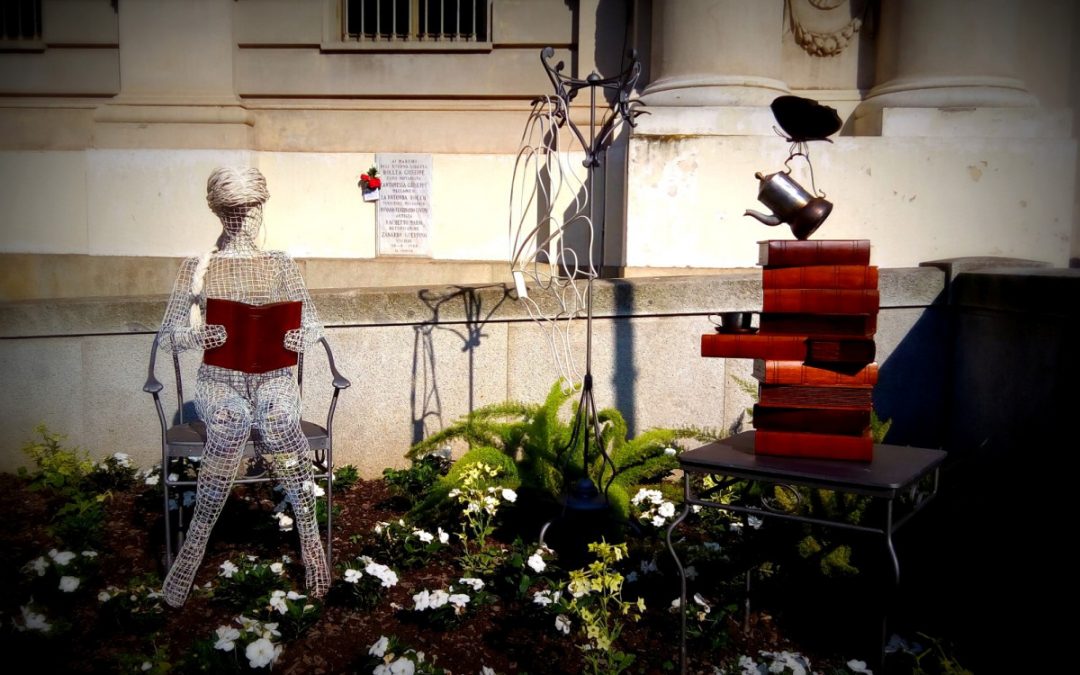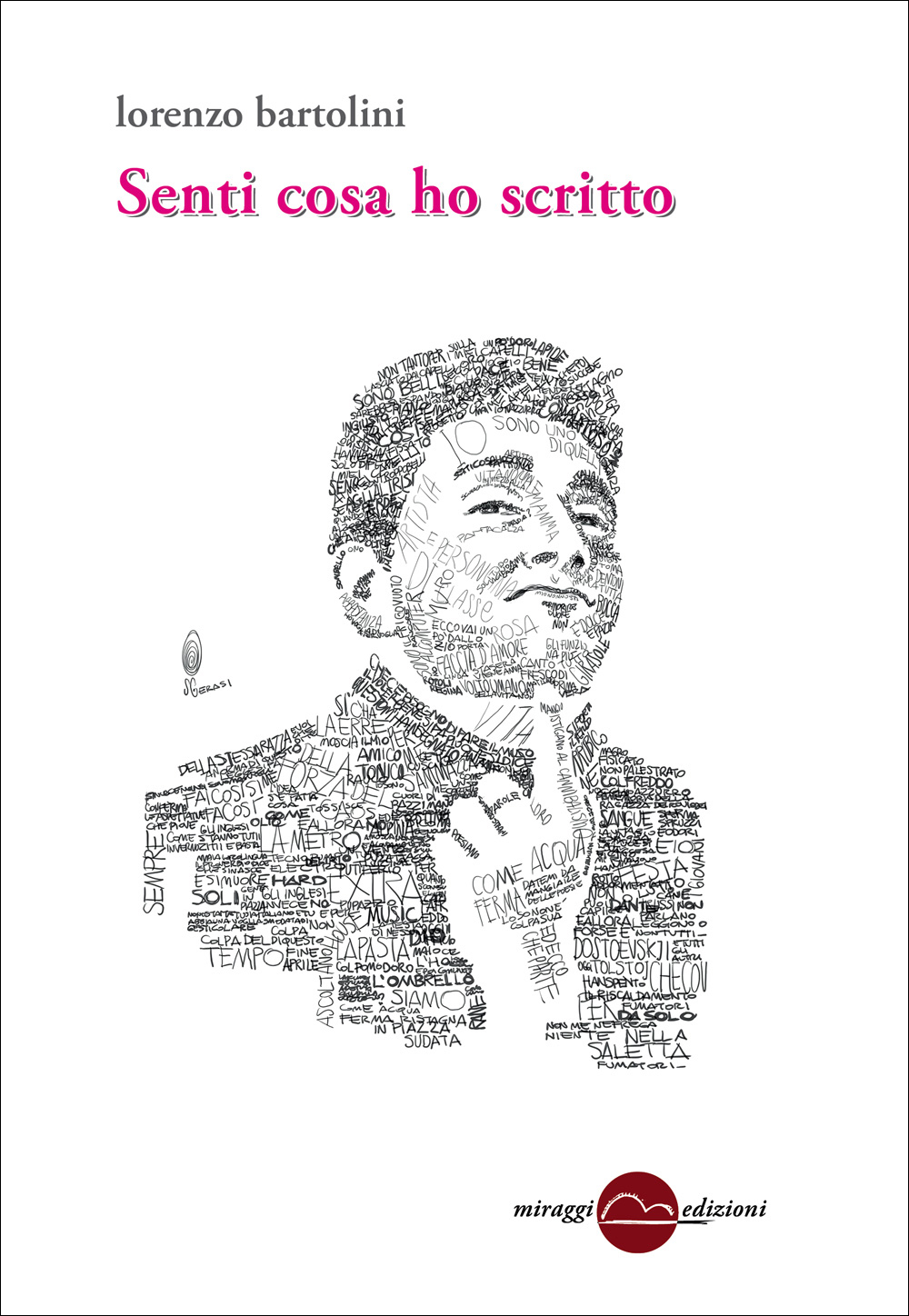
Senti cosa ho scritto: la recensione di Fabiana Marzotto su Tre Mandorle al dì
Io amo le cose belle, le cose ricercate, le cose preziose. E oggi proprio di questo parleremo. Oggi ci facciamo trafiggere da una freccia poetica destinata a lasciare il segno.
Oggi vi presento “Senti cosa ho scritto” di Lorenzo Bartolini, pagine in versi suddivise in tre tempi. E il fatto che “Giugno in parole” dell’anno scorso fosse dedicato a un altro grande artista – che risponde al nome di Roberto Mercadini e che firma la prefazione del libro – non è un caso.
Sono emozionata, entusiasta, orgogliosa di avere letto queste righe e di avere conosciuto il loro padrone. Tutti dovremmo avere Lorenzo come amico, come conoscente, come poeta. A nessuno dovrebbe essere negato il diritto di godere delle sue parole, parole che si posano come polvere di stelle sulle nostre palpebre chiuse, parole che illuminano di meraviglia ogni sfaccettatura della realtà su cui si posano.
Lorenzo è un attento osservatore di ciò che lo circonda e ciò che i suoi occhi, la sua pelle e il suo cuore percepiscono viene riflesso in uno stile fatto per essere letto, uno stile pulito, nitido, gentile e indagatore dell’animo umano.
Non è possibile non rimanere incantati e stupiti dalla dolcezza e dalla sensibilità racchiuse in questi fogli di carta che ci conducono per mano in lande calorose e colorate.
Salpiamo sulla barca Bartolinica per un viaggio in una poesia che ha il potere di espandersi e occupare ogni spazio libero. Una poesia che ci mostrerà tutto ciò su cui lo sguardo, il tocco e la penna di Lorenzo si sono soffermati creando parole, immaginari e cornici da riempire di bellezza.
Una prima cornice, forse La cornice, è l’Amore: ogni poro di ogni foglio di carta trasuda amore; amore per la mamma, per la fidanzata, per la nipote, per l’amico, per le città (e Torino non poteva mancare). Ogni riga è un inno ad amare e a non avere paura di farlo e di scriverlo. Ogni riga è un inno a vivere ogni stato d’animo, anche quello che porta con sé il freddo vissuto da un cuore privato per un istante dal calore dell’amore a causa di una lite. Ogni riga è un inno a curarsi a suon d’affetto e a lasciarsi trasportare dallo stupore che avvolge ciò che ai più appare ovvio.
Una seconda cornice è la Vita, vita che ci appare straordinaria nella sua scansione temporale ordinaria. Vita che si compone di grandi temi affrontati con la bellezza della semplicità e della bontà di cuore. Qui la poesia riesce a smuovere le coscienze, a diventare uno spillo che ha il potere di sgonfiare quell’enorme bolla che ci costruiamo per non vedere ciò che non ci tocca da vicino. Uno spillo che fa convivere in un buco piccolissimo vino e vergogna. Ma la vita è anche gioco: un modo per rinfrancarsi dalla potenza e dall’energia delle passioni. E’ una pausa per fermarsi a riflettere e a ragionare, sospendendo quella frenesia che non è altro che una cattiva consigliera. La vita è anche non morte e quindi regno assorbente di ogni pensiero.
Una terza cornice è composta dai Ricordi poetici, lettere che sprigionano meraviglia, gioia, generosità, vicinanza, parità. Sono frammenti di attimi di riconoscimento di anime. E’ una cornice libera dove il poeta crea il suo mosaico emozionale che funge da stimolo per il lettore, il quale così potrà dare il suo valore emozionale alle parole che legge, riempiendo di luoghi, sensazioni e persone la terra, la natura e i gesti.
Questo è un lavoro che ha lo splendore e il fascino di una cometa persistente da un lato e la forza educativa ai sentimenti dall’altro. Qui le parole vibrano, si mescolano, si scuotono e danzano al ritmo di una musicalità inedita, una musicalità di cui non potremo e non vorremo più fare a meno.

I love the beautiful things, the valued things, the precious things. And today we will talk about these things. Today the poetical arrow will pierce us and it will leave a sign.
Today I present you “Senti cosa ho scritto” (You listen what I wrote), Lorenzo Bartolini’s verses divided in three times. It isn’t a coincidence that last year I talked about an other big artist in “The words of June” section: his name isRoberto Mercadini and he signs the book preface.
I am touched, enthusiastic, proud because I read these lines and I met its owner. Everyone would have to have Lorenzo as friend, acquaintance, poet. Everyone would have to have the right to enjoy his words, which place like stars dust on our closed eyelids, words that light every reality side with magnificence.
Lorenzo is careful observer and what his eyes, skin and heart sense has reflected in his style, a style to read, a clean style, a gentle style, a human spirit investigator style.
We are enchanted and amazed of his sweetness and sensitivity included in these sheets of paper, which join our hands to bring us toward loving and coloured lands.
With his ship, we sail off into the poem, a poem that has the power to grow and capture every free space. A poem that shows us Lorenzo’s reality: his gaze, his style and his pen create words, imaginations and frames to fill up with beauty.
A first frame, maybe the frame, is the Love: every pore of every sheet of paper trickles love; love for the mum, for the girlfriend, for the niece, for the friend, for the cities (and Turin is here). Every line is an ode to love and to not fear to love and write it. Every line is an ode to live every state of mind, even the state of mind that brings the cold lived by the heart when the warm of the love misses for a moment because of a fight. Every line is an ode to take care of us with the love; it is an ode to be surprised about what a lot of persons believe obvious.
A second frame is the Life, life that appears us extraordinary in its ordinary temporal scan. Life with its big questions faced with the beauty of ease and heart kindness. Here the poems move the awarenesses, they are a pin that deflates the big ball which we build around us to not watch what is not near us. A pin that creates a little hole where wine and embarrassment live side by side. But the life is a game too: a way to refresh us from the passions power and energy. It is a pause to stop and to think, without the frenzy that isn’t a good advisor. The life is a not death too and so it is a kingdom that absorbs every thought.
A third frame has made by poetical Memories: the letters give off marvel, delight, altruism, affinity, parity. They are fragments of instants of souls identification. It is a free frame where the poet creates his emotional mosaic that acts as an incentive for the reader, which will give his emotional value to the read words and he will fill up with places, sensations and people the land, the nature and the gestures.
This work shines as a persistent comet and it has the power to educate to the emotions. Here the words are vibrant, they shake, they dance with a fresh sound that will become indispensable for us.
Giugno in parole / The words of June: “Senti cosa ho scritto” di Lorenzo Bartolini


